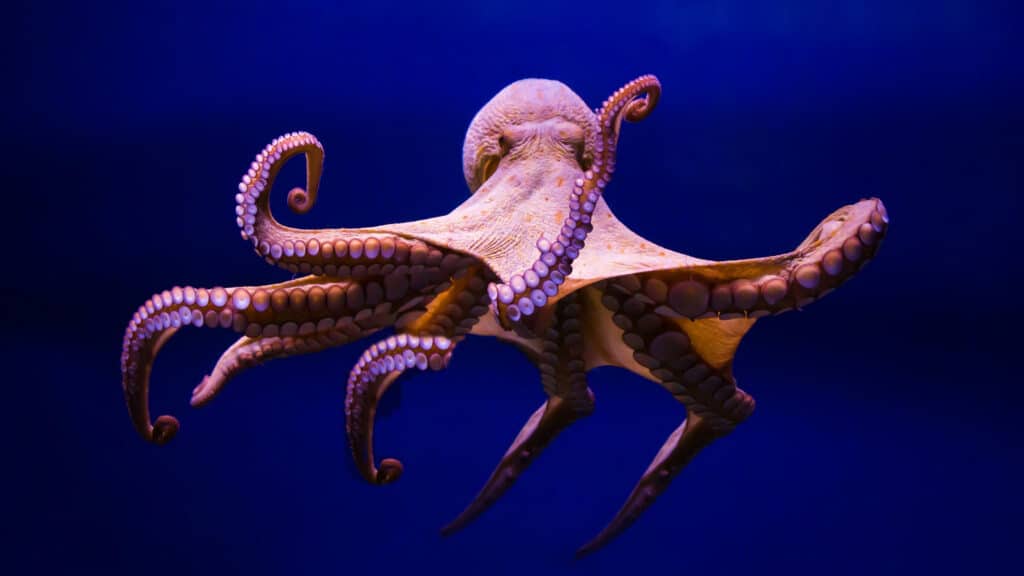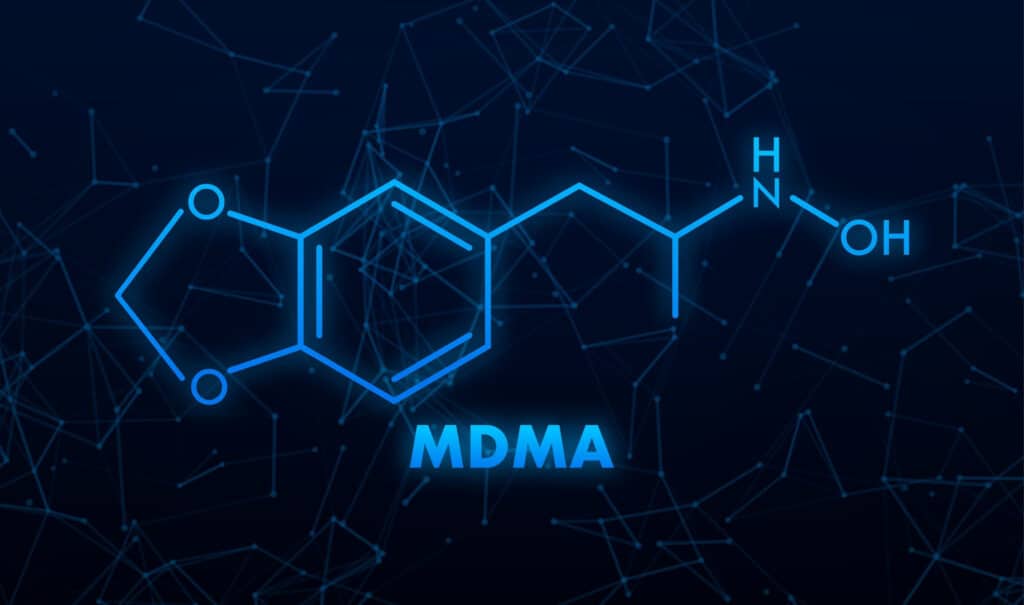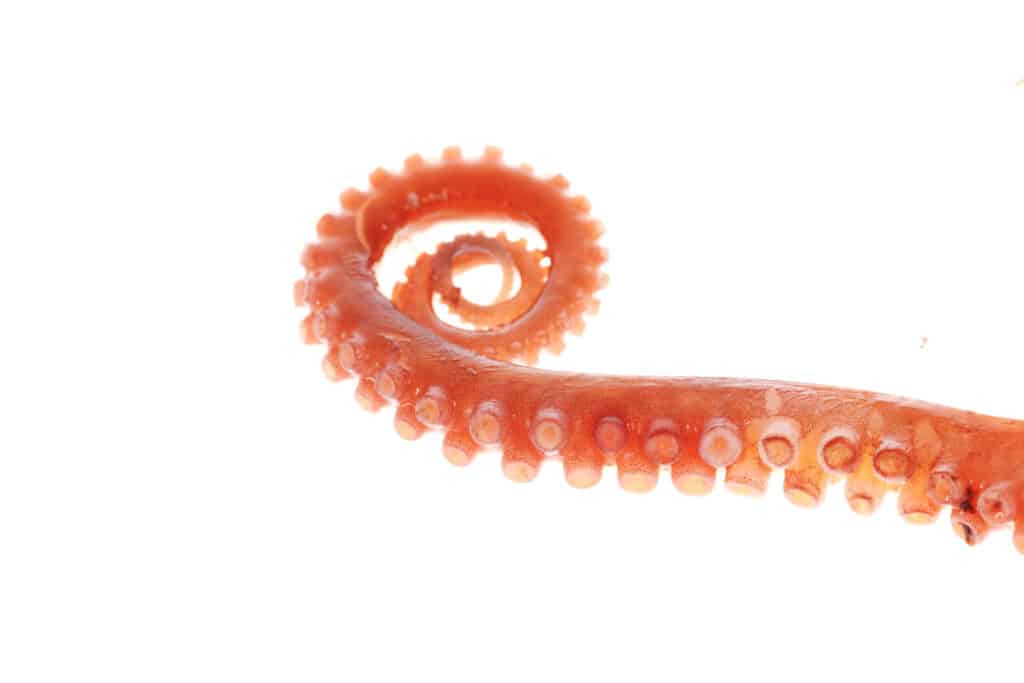This is not a new study, but in light of the changing views on MDMA, I thought it was relevant to take a look at it now. It answers the extremely important question of what happens when you give octopuses an entheogenic drug like MDMA. It goes into how octopuses respond to MDMA; and in doing so, gives insight into our own human experience.
A little on octopuses
An octopus is an eight-armed mollusk. Its an invertebrate, meaning it doesn’t have a a skeletal structure made of bones, but rather of muscle and fluids. There are around 300 species of these sea creatures. They are symmetric animals, with a central face consisting of two eyes and a beaked mouth. They have excellent sight, an intricate nervous system, and are thought to be one of the most intelligent invertebrates.
They come in various sizes ranging from the Pacific Octopus, which is generally around 15kg, to the tiny Octopus wolfi, which can be as small as one gram. There are reports of very large ones, however, with weights over 70kg, and in one case, 272kg. The arm span can be anywhere from 2.5cm for the small guys, to around 4.3 meters for the big ones (with much larger cases exhibiting much larger arm spans).
One of the things octopuses are known for, is the ability to greatly change their shape, often helping them get through small spaces. They are not the longest living of creatures, with lifespans from about six months to five years, depending on species. The male’s life ends right after he directly puts sperm into the female, with an arm specially made for this. She puts the eggs somewhere for safe keeping until they can hatch, and then goes off to die herself. They only mate once in life, so how long it takes to get to that, is often directly related to how long they live.

Though there are examples of octopuses living in social communities, they’re generally known as independent animals that live solitary lives; except when mating. Its thought that the social examples are related to having more-than-enough food, while not having enough living space. As always, there are exceptions. The Larger Pacific Striped Octopus can not only mate several times, but is known as more social than other species; sometimes living in communities with as many as 40 other octopuses.
Octopuses generally live in dens. They’re thought to be good at problem-solving, with both short-term and long-term memory systems. They’ve been shown to distinguish between shapes and patterns; possibly show observational learning; and sometimes engage in behavior that resembles playing.
Background on study of octopuses and MDMA
If you look at the study title: A Conserved Role for Serotonergic Neurotransmission in Mediating Social Behavior in Octopus, you probably won’t immediately assume it has anything to do with MDMA, but it does. In 2018 the study was published in Current Biology, and describes among other things, the prosocial behavior exhibited by octopuses when given MDMA.
The researchers start by explaining that humans and octopuses have brains anatomically different, which makes sense as humans and octopuses have gone through 500 million years of evolution separately. Given this, researchers point out that there’s a lot of evidence that vertebrate and invertebrate species share similar neurotransmitter systems, going back to ancient times; sometimes with similar or overlapping functional aspects.
They also point out that social behavior is common in the animal world, both for vertebrates and invertebrates. They give the examples of fish, birds, rodents, and primates in the former category; and bees, ants, termites, and shrimp in the latter. They then talk about how serotonin has been involved in brain structures since ancient times, and that it plays a role in social behavior with both animal groups.
Next they talk about octopuses. Octopuses, of the taxonomical order Octopoda, are generally not social creatures, and usually live their lives in solitary fashion. Researchers point out that behavioral studies show a possible temporary interruption in this generally solitary nature, when it comes to mating. Otherwise they were uncertain whether octopuses, like other animals, have the same conserved sequences (sequences passed on through time) for prosocial behavior.

Since octopuses are able to change their behaviors for mating, the researchers posited that perhaps octopuses have the same general mechanisms for social behavior; but that they’re suppressed aside from mating. Researchers decided to test this out, by giving octopuses MDMA; to see if they respond to it like humans do, with an increase in prosocial behaviors. They specifically looked at the species Octopus bimaculoides.
How researchers tested social response in octopuses
Researchers looked into different things, with the goal of seeing if MDMA promotes prosocial behavior in octopuses, against their generally non-social normative behavior. In order to do this, the researchers had to quantify social behavior in some way, and get a baseline measurement.
They used a measure often used with rodents. They took a glass aquarium with partitions to create three sections; all of equal size. In the side chambers they put either a regular object (not related to gender), or a social object (either a male or female octopus). The center chamber remained empty, as the test area. The octopus acting as the social object was separated by perforated plastic; that allowed visual, tactile, and chemical signals to go through. It’s thought that octopuses communicate socially by these means.
The octopuses were allowed to explore all the chambers for 30 minutes. Both genders spent more time in the social chamber when a female was inside. When it was a male, both genders spent more time in the object chamber. The same amount of time was spent in the center in both circumstances; and in both circumstances, the most time was spent in the object container. All this indicates a preference for females over males; a preference for something over nothing; and a preference for a non-social object over a social situation. This was used as a baseline measurement.
Testing social response in octopuses after MDMA
MDMA, or 3,4-Methylenedioxymethamphetamine, is a synthetic compound which is classed as a psychostimulant. In many ways it acts like a classic psychedelic, promoting a large serotonin response. It’s been gaining headway as a drug to help alleviate PTSD symptoms; as well as a substance that can help with things like relationship and sexual issues. The latter is at least in part because it promotes prosocial behavior in humans. This second point is important for this investigation; as it has to do with observing social behavior.
After assessing basic social behaviors, researchers went on to test how MDMA affects them. Researchers wanted to determine if MDMA leads to octopuses being more willing to go to an object (male), that they normally go away from. To do this, the same setup was used of three different chambers; but in the social chamber, only a male was used.

The MDMA was given 5-24 hours after baseline. The octopuses were bathed in an MDMA bath for 10 minutes, followed by a saline wash for 20. Then another half hour trial. This time, both genders spent more time in the social chamber. The time spent in the object and center containers was not considered significantly changed, as not all test subjects responded the same. The graphs do show a general decrease in the object part, and a slight increase in the center. In only the social compartment did all test subjects show universal increase.
Researchers also noticed how the animals socially interacted. Prior to MDMA treatment, though the animals did socially interact, it was generally limited to nothing more than one arm out to the other. After taking MDMA, there was much more contact, especially in ventral areas. It didn’t appear to be aggressive, but instead, like the animals were exploring each other.
From this, researchers concluded that octopuses do have the capacity for social behavior, but that its normally suppressed; they found that MDMA works to increase these generally suppressed prosocial behaviors. This indicates that though these behaviors aren’t seen without the drug, that octopuses do have prosocial behavior in evolutionary conserved sequences, within their genetic structures.
Said study lead Gül Dölen, M.D., Ph.D, of the Johns Hopkins University School of Medicine, “The brains of octopuses are more similar to those of snails than humans, but our studies add to evidence that they can exhibit some of the same behaviors that we can. What our studies suggest is that certain brain chemicals, or neurotransmitters, that send signals between neurons required for these social behaviors are evolutionarily conserved.”
Conclusion
This study is from a few years ago, and while it did get attention when it came out, at the time MDMA was still much farther from acceptance than it is today. In today’s world, this study has a huge amount of value in showing that the effects of MDMA don’t just affect humans, but might have a more universal appeal, across the animal kingdom.
To give an idea of the current landscape, Colorado passed an MDMA legalization contingent on US government legalization last year; Australia recently became the first country to medically legalize the substance; and many other states are looking to pass legislation to allow the compound medically.
Welcome one and all. We appreciate you joining us at Cannadelics.com, an independent news source in the drugs space, with a particular focus on cannabis and hallucinogens. Come around regularly to get your updates; and subscribe to the Cannadelics Weekly Newsletter, for top notch product promos, along with the news.









